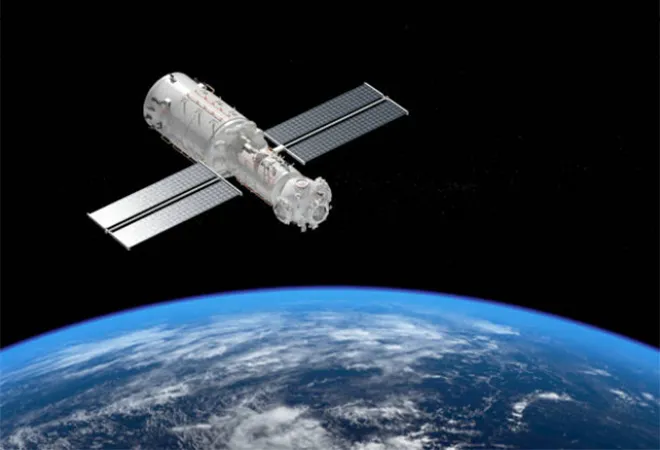
While the climate crisis has gained impetus in recent times and resulted in multitudes of climate actions, a parallel, albeit less ardent conversation has been occurring around promoting the sustainable use of outer space.
Space sustainability would ensure that all humanity can continue to use outer space for peaceful purposes and for its socioeconomic benefit now and in the long term. This notion is gaining ground, and as a result,
World Space Week this year is themed around ‘Space and Sustainability’. Among other things, the 2022 theme seeks to specifically inspire focus on the challenges the world faces to keep space safe and sustainable.
Such
challenges are endless in both quantitative and qualitative terms, i.e., they are several and severe, ranging from satellite crowding and collision risk to space debris in the Low Earth Orbit (LEO). The sense of urgency around space sustainability is already skyrocketing—
more than 80 countries currently contribute to the
over 6,800 active satellites in orbit, of which many are used for both civilian and military purposes, as well as over
30,000 pieces of orbital debris. Given the development of new and emerging space technologies, the rapid militarisation and securitisation of space, and the
growing distrust amongst nations in the domain, space activity is only set to increase and acquire a more national security-oriented focus.
Space sustainability would ensure that all humanity can continue to use outer space for peaceful purposes and for its socioeconomic benefit now and in the long term.
This is already visible in several countries around the world. There has been a
recent uptick in the development and testing of destructive anti-satellite (ASAT) weapons, with
26 tests in the past two decades conducted by the four countries that have access to these weapons (US, Russia, China, and India). France, which is currently leading the European Council, has also
invested several billion euros into military space capabilities, and regularly emphasises the security importance of space for other EU countries. Australia set up its
Defence Space Command in early 2022 to increase its strategic potential in space, and South Korea
deployed a spy satellite to better monitor North Korea in June 2022, giving its military space plan a huge push. However, none of these countries have a sustainability provision in their defence space operations or programmes.
Sustainability and security are
two sides of the same coin, but as a result of this inherent dichotomy, they are often juxtaposed against each other. The contrast between highly motivated and funded national security efforts and the relatively non-prioritised international engagements around space sustainability is an example of a larger trend of indifference towards sustainable development in favour of higher military spending. To substantiate this point, funding for the Sustainable Development Goals (SDGs) was adversely affected due to COVID-19 in 2021, and this reportedly
dramatically pushed back progress on the SDGs, but the global military expenditure has consistently been on an upward incline and
crossed the US$2 trillion mark for the first time in the same year.
The contrast between highly motivated and funded national security efforts and the relatively non-prioritised international engagements around space sustainability is an example of a larger trend of indifference towards sustainable development in favour of higher military spending.
The trade-off between security and sustainability can jeopardise sustainable development within a plethora of issue domains, thus, increasing the likelihood of exhausting limited resources. This in turn could exacerbate the risk of conflict due to the resulting scarce resources, ultimately creating a vicious cycle of securitisation and conflict. As a case in point, the incumbent space race has always been marked by competing security and commercial interests, which has resulted in a constant escalation of global government spending on space programmes to its
record value of US$98 billion in 2021. Space sustainability, on the other hand, has only seen activity recently, and primarily in an international and voluntary set-up.
Reinforcement of regulations
A
Working Group on the Long-term Sustainability of Outer Space Activities was set up by the
Committee on the Peaceful Uses of Outer Space (COPUOS) in 2010, which has 95 UN member states taking part in it. The Group adopted a
set of guidelines by consensus in 2019, although it failed to make these guidelines or any other regulations legally binding. It agreed to work over it for
5 years from 2022 onwards, but since the Group uses a consensus-based approach to reach agreements, it is difficult to expect more stringent or extensive regulatory frameworks to emerge from it. Consensus-based approaches in multilateral forums, especially related to arms or other security objectives, often contrast with individual national security interests of its member states and have been criticised for their slow or ineffective progress. Another example of this is the Convention on Certain Conventional Weapons’ (CCW)
Group of Government Experts (GGE) meetings on lethal autonomous weapons systems (LAWS), which have only produced a set of 11 non-binding guiding principles since deliberations around LAWS began in 2014.
The trade-off between security and sustainability can jeopardise sustainable development within a plethora of issue domains, thus, increasing the likelihood of exhausting limited resources.
Outside of multilateral efforts, other organisations are funding or carrying out activities of their own to promote space sustainability. The World Economic Forum, for instance, introduced a new standard called the
Space Sustainability Rating (SSR), in 2022, which aims to recognise, reward, and encourage space actors to design and implement sustainable and responsible space missions. It remains to be seen whether countries will respond favourably to tools like the SSR, which are based on a positive reinforcement model, to be more space sustainability-conscious.
Going by any metric, space sustainability is only at the cusp of becoming actionable. When space experts, intergovernmental organisations, or countries themselves conclude that sustainability should be a part of their space mandate, and when they devise possible methods to help achieve this, they cannot do so in a vacuum. Just as sustainability on Earth needs to take into account numerous contextualities and be pluri-definitional, ultimately resulting in
multiple priorities and indicators for effective action, so does sustainability in space.
The views expressed above belong to the author(s). ORF research and analyses now available on Telegram! Click here to access our curated content — blogs, longforms and interviews.



 While the climate crisis has gained impetus in recent times and resulted in multitudes of climate actions, a parallel, albeit less ardent conversation has been occurring around promoting the sustainable use of outer space.
While the climate crisis has gained impetus in recent times and resulted in multitudes of climate actions, a parallel, albeit less ardent conversation has been occurring around promoting the sustainable use of outer space.  PREV
PREV


